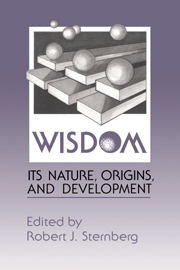Book contents
- Frontmatter
- Contents
- List of contributors
- Preface
- Part I Approaches to the study of wisdom
- 1 Understanding wisdom
- Part II Approaches informed by philosophical conceptions of wisdom
- Part III Approaches informed by folk conceptions of wisdom
- Part IV Approaches informed by psychodevelopmental conceptions of wisdom
- Part V Integration of approaches and viewpoints
- Name index
- Subject index
1 - Understanding wisdom
Published online by Cambridge University Press: 05 June 2012
- Frontmatter
- Contents
- List of contributors
- Preface
- Part I Approaches to the study of wisdom
- 1 Understanding wisdom
- Part II Approaches informed by philosophical conceptions of wisdom
- Part III Approaches informed by folk conceptions of wisdom
- Part IV Approaches informed by psychodevelopmental conceptions of wisdom
- Part V Integration of approaches and viewpoints
- Name index
- Subject index
Summary
To understand wisdom fully and correctly probably requires more wisdom than any of us have. Thus, we cannot quite comprehend the nature of wisdom because of our own lack of it. But if scientists were to demand total understanding, they would quickly be out of their jobs, because total understanding is something we can fancy we are approaching, but it is almost certainly not something we can ever achieve. And if we are to believe the authors of the chapters in this book, the recognition that total understanding will always elude us is itself a sign of wisdom.
The chapter authors take a number of different approaches to understanding wisdom. Any attempt to classify these approaches is bound to be an oversimplification, and a rather gross one at that. Yet, in order to give readers at least a rough lay of the land, I have sought to divide the book into five parts, the middle three of which represent three distinctive, although overlapping, approaches to understanding wisdom and the first and last of which respectively serve to introduce and to integrate the three approaches. The three approaches draw on philosophical, folk, and psychodevelopmental views of wisdom, respectively.
Part I, Approaches to the Study of Wisdom, comprises just the present chapter, chapter 1, which sets the stage for “understanding wisdom.” This chapter describes the three main approaches used by authors of this book in understanding wisdom and briefly summarizes the main contents of each chapter.
- Type
- Chapter
- Information
- WisdomIts Nature, Origins, and Development, pp. 3 - 10Publisher: Cambridge University PressPrint publication year: 1990
- 19
- Cited by



